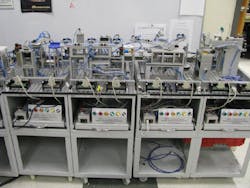As manufacturing operations increased in the U.S. for the first time in years, a significant part of the discussion around this resurgence has focused on the lack of experienced workers to take on the new jobs being created. Companies that are hiring cite the lack of real-world experience held by recently graduated engineers as well as the problem of many former manufacturing workers not being trained well enough to function efficiently in the more highly automated environments of today’s manufacturing.
Industry observers and politicians have highlighted the German model of apprenticeships as being a possible solution for the U.S., but not many North American companies are visibly stepping up in that department yet. (Please correct me if I’m wrong on this statement with some evidence of noteworthy U.S. apprenticeship programs.) There have also been numerous calls for academic institutions, such as community colleges, to deliver more relevant education that can be applied immediately in manufacturing facilities.
One example of a community college doing just that is the Sierra Community College in Rocklin, CA, which offers certificates and associate’s degrees in mechatronics. If you're unfamiliar with the term, mechatronics refers to any system that incorporates mechanical, electrical, and computer control. Robotics and industrial automation are considered core examples of mechatronics.
The college’s mechatronics labs are funded by more than $900,000 in state and federal grants, which helps keep attendance costs low (just $36 per unit according to the college’s Web site).
“All of our curriculum was developed in consultation with local industry, so we are teaching real-world skills needed in today’s job market,” says Tony Osladil, professor, Mechatronics, Sierra College. “We are a hands-on program, turning out world-class automation technicians with the skills to hit the ground running. Our students have been hired by companies all over California and other parts of the U.S. Cirque du Soleil has been here twice from Las Vegas to recruit our graduates and they proclaimed our program one of three in the nation of this caliber. Local employer Telefunken Semiconductor told us that job applicants from our program were far better prepared than any other applicants they had and they have since contracted us to teach classes to raise the technical skills of their employees.”
Other local employers that regularly hire graduates from Sierra College’s mechatronics program include Nestle Waters, Sierra Pacific lumber, City of Roseville, Ceronix, Smartrise Elevators and Sugar Bowl Ski Resort.
Some of the skills taught as part of the college’s mechatronics program include:
• Industrial safety fundamentals (lockout/tagout, personal protection, equipment, etc.)
• Precision measurement (calipers, micrometers, etc.)
• Basic electricity (single phase and three phase power, transformers, AC to DC conversion, etc.)
• Industrial wiring standards (wire gauges, color codes, connector types, circuit breakers, etc.)
• Relays and contactors
• PLC programming
• Electric motors (AC and DC) and solenoids
• VFD control of AC motors
• Stepper and servo motors
• Industrial sensors (temperature, pressure, capacitive, inductive, optical, etc.)
• NIST-traceable instrument calibration
• HART sensor communication
• Fundamentals of mechanical drafting
• Basic sheet-metal work (shears, brakes, punches, bend allowances, etc.)
• Use of machine tools (drill press, mill, lathe, etc.)
• Electronic soldering skills, including surface mount technology (SMT)
• Voltage, current and resistance/reactance relationships for DC and AC circuits
• Schematic diagram analysis and actual circuit construction
• Schematic capture and simulation, PC board layout and design rule checking
• Applications of transistors and integrated circuits in both analog and digital circuits
• Proper use of electronic measurement equipment (voltmeters, oscilloscopes, clamp-on ammeters, etc.)
• Closed-loop industrial control systems
• PID control
• Basic pneumatics and hydraulics (schematics, computer simulation and actual hands-on system implementation)
• Computer repair and upgrade (hardware and OS installation, hard-drive backup/recovery, networking, etc.)
• Microcontroller programming and hardware interface techniques.
You can learn more about Sierra College’s Mechatronics department at its Web site: www.RealSkillsRealJobs.com.

